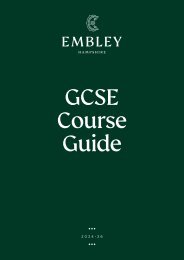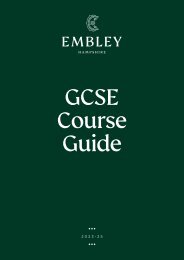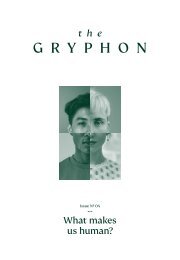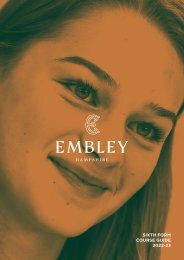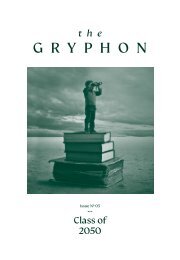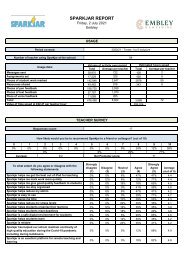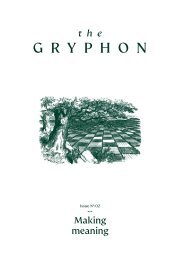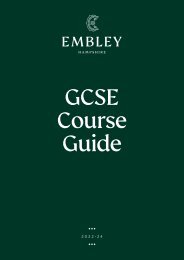the Gryphon - Issue 3
You also want an ePaper? Increase the reach of your titles
YUMPU automatically turns print PDFs into web optimized ePapers that Google loves.
t h e<br />
G R Y P H O N<br />
<strong>Issue</strong> N o 03<br />
Class of<br />
2050
‘EDUCATION<br />
IS NOT THE<br />
FILLING OF A<br />
PAIL, BUT THE<br />
LIGHTING OF<br />
A FIRE.’<br />
W.B. YEATS<br />
12
Welcome<br />
<strong>Issue</strong> N o 03<br />
SUMMER 2021<br />
Welcome to <strong>the</strong> Summer edition<br />
of our termly chapbook, <strong>the</strong><br />
<strong>Gryphon</strong>, where we look into <strong>the</strong><br />
future and examine what school<br />
may look like for children in<br />
30 years time.<br />
2<br />
IT’S LIFE JIM…<br />
AND JUST AS WE KNEW IT<br />
How <strong>the</strong> power of knowledge and<br />
formation of individuals will still prevail in<br />
a world of intellectual computing.<br />
4<br />
At Embley every child is unique<br />
and deserves <strong>the</strong> recognition<br />
of that as <strong>the</strong>y grow. We help<br />
<strong>the</strong>m achieve <strong>the</strong>ir ambitions,<br />
encourage belief in oneself while<br />
being mindful that <strong>the</strong> greatest<br />
happiness is achieved by being<br />
compassionate to o<strong>the</strong>rs.<br />
Embley Park, Romsey,<br />
Hampshire SO51 6ZE<br />
Main switchboard:<br />
+44 (0) 1794 512206<br />
Email: info@embley.org.uk<br />
www.embley.org.uk<br />
A SPACE FOR LEARNING<br />
While technology will be an enabler of<br />
successful learning, <strong>the</strong> classroom will<br />
look reassuringly familiar.<br />
6<br />
OPPORTUNITY & ASPIRATION<br />
How schools of 2050 should offer<br />
breadth, choice and opportunity.<br />
8<br />
THROUGH THE<br />
LOOKING GLASS<br />
Embley pupils imagine a virtual school of<br />
<strong>the</strong> future for specific moments, across<br />
boundaries and even space.<br />
10<br />
A DYSTOPIAN STORY<br />
A story of Emily and her sister Tessie as<br />
<strong>the</strong>y battle for survival, by Hannah in Year 8.<br />
12<br />
Carbon balanced print is produced by a carbon<br />
balanced printer on carbon balanced paper.<br />
This edition of <strong>the</strong> <strong>Gryphon</strong>:<br />
73kg of carbon balanced & 51m 2 of land protected.<br />
THE HUMAN ELEMENT<br />
OF TEACHING<br />
The importance of interpersonal<br />
relationships in teaching now and<br />
in <strong>the</strong> future.<br />
1
It’s life Jim…and<br />
just as we knew it<br />
In a world of intelligent computing, <strong>the</strong> power of<br />
knowledge and formation of individuals will still<br />
prevail writes Headmaster, Cliff Canning.<br />
Illustration by Greg Joens<br />
2
t h e<br />
G R Y P H O N<br />
Remember Spock? It will certainly date me<br />
and offer opportunity to draw all kinds of<br />
conclusions, but he was my favourite character<br />
on Star Trek. I mean of course, <strong>the</strong> “real” Star<br />
Trek! Every Christmas among <strong>the</strong> gifts Fa<strong>the</strong>r<br />
Christmas delivered was <strong>the</strong> prize gift of<br />
all, <strong>the</strong> Star Trek annual. I loved <strong>the</strong> sense of<br />
adventure, <strong>the</strong> possibilities a little lad in a tiny<br />
corner of a little place could be transported<br />
to. Teleporters, being beamed up and down to<br />
new planets and <strong>the</strong> uncompromising logic<br />
of Spock. I was quite taken aback recently<br />
when some parents commented on how<br />
tickled <strong>the</strong>y were to read <strong>the</strong> “kobayashi maru”<br />
reference in our parent and staff newsletter,<br />
Highlights. The ability to beat a system by<br />
stepping outside of it and not playing by<br />
<strong>the</strong> rules.<br />
This issue of <strong>the</strong> <strong>Gryphon</strong> challenges what our<br />
sense of education will be by <strong>the</strong> year 2050. I<br />
only imagined as a small boy <strong>the</strong> notion of<br />
communication by video, I saw James T do it,<br />
but it was science fiction wasn’t it? Hmm OK,<br />
point taken.<br />
There is no doubt that <strong>the</strong> technology Rubicon<br />
has been crossed and <strong>the</strong>re is no going back, but<br />
nei<strong>the</strong>r should <strong>the</strong>re be. I suspect by 2050 <strong>the</strong><br />
presence of a ‘Siri’ or ‘Alexa’ as a companion in<br />
<strong>the</strong> classroom will be an established reality, but<br />
I mean as a bespoke companion to each child,<br />
<strong>the</strong>ir virtual paidagogos if you will. Consider<br />
some of <strong>the</strong> dynamics of what is involved in<br />
teaching. The classroom instructional piece,<br />
crucial and irreplaceable (remote learning<br />
during Covid has illustrated <strong>the</strong> consequence<br />
in terms of human relationship of its absence).<br />
The teacher having set <strong>the</strong> direction of<br />
<strong>the</strong> class takes homework and collects in<br />
marking to read a similar thing 15 or 20<br />
times, more if <strong>the</strong>y have a number of classes.<br />
Mistakes are identified and <strong>the</strong> revised plan of<br />
instruction developed to tackle that which was<br />
misunderstood first time round. Why couldn’t<br />
intelligent computing ‘read’ <strong>the</strong> work, identify<br />
<strong>the</strong> common areas of misunderstanding and<br />
<strong>the</strong> areas where knowledge is sound? The<br />
teacher <strong>the</strong>n has an immediate focus for <strong>the</strong><br />
next development and maps <strong>the</strong> way forward.<br />
In class, <strong>the</strong> virtual teaching assistant sitting<br />
with every pupil <strong>the</strong>n iteratively increases <strong>the</strong><br />
level of difficulty, <strong>the</strong> better to allow each child<br />
to be <strong>the</strong>ir best. This is not a version of Google<br />
by ano<strong>the</strong>r means, but a bespoke companion<br />
understanding <strong>the</strong> cognitive and, who<br />
knows, by 2050 maybe even <strong>the</strong> emotional<br />
understanding of <strong>the</strong> child.<br />
The second observation I would make is<br />
that knowledge will still be central. Seems<br />
idiotically tautologous but I am suggesting <strong>the</strong><br />
primacy of children working to understand<br />
difficult concepts. I deliberately didn’t use <strong>the</strong><br />
phrase “struggling to understand” because<br />
it suggests <strong>the</strong>re is something wrong or<br />
unacceptable. There isn’t. Some stuff is just<br />
difficult to understand and that is fine. The<br />
2050 issue I am highlighting is <strong>the</strong> change in<br />
focus of our understanding and engagement<br />
with <strong>the</strong> process. Children will be more<br />
pedagogically literate; <strong>the</strong>y will understand<br />
that education happens through, not to, <strong>the</strong>m.<br />
They are active participants in a process, not<br />
<strong>the</strong> passive recipients of data and instruction.<br />
This is a cultural not a technological shift but<br />
a necessary one as we pivot to a system that<br />
prepares children for an au<strong>the</strong>ntic life. School<br />
is not an ivory tower nor a proving ground<br />
away from reality. In preparing children for<br />
life, “life” is not a remote destination arrived<br />
at after Year 13 but <strong>the</strong> thing <strong>the</strong>y are doing<br />
right now.<br />
The final note may be a surprising one.<br />
Remember Spock? The Enterprise was replete<br />
with only to be imagined gadgetry, but it was a<br />
‘bit-part’ player to <strong>the</strong> characters. It is this that<br />
is core, <strong>the</strong> intrinsic quality of what makes us<br />
ourselves after all <strong>the</strong> costumery of tech has<br />
been stripped away and put back in <strong>the</strong> props<br />
department. Tech; gadgetry; stuff won’t make<br />
<strong>the</strong> world a better place; won’t save <strong>the</strong> planet;<br />
won’t make us happier or healthier; people do<br />
that and <strong>the</strong>ir characters form <strong>the</strong>ir intent.<br />
The formation of individuals, ambitious to<br />
understand, confident of <strong>the</strong>ir own value and<br />
compassionate of o<strong>the</strong>rs will continue to be<br />
central to what Embley does, not because it is<br />
innovative, but because it isn’t.<br />
E: headmaster@embley.org.uk<br />
3
A Space<br />
for Learning<br />
The classroom of 2050 will be reassuringly<br />
familiar with technology continuing to be an<br />
enabler for successful learning writes our<br />
Deputy Head, José Picardo.<br />
4
t h e<br />
G R Y P H O N<br />
During a school holiday not too long<br />
ago, I visited a museum that featured a<br />
meticulous recreation of a Victorian classroom.<br />
Chalk and caning aside, I was struck by <strong>the</strong><br />
similarities with classrooms today, well over<br />
one hundred years later: a dais, a board, desks<br />
and exercise books all seemed reassuringly<br />
familiar. Sure, educational philosophies have<br />
pendulated between traditionalism and<br />
progressivism various times, and pedagogy<br />
has matured to take into account what science<br />
and research have ascertained about how<br />
best to teach and learn since those desks were<br />
last occupied by school children who weren’t<br />
dressing up.<br />
This got me thinking about <strong>the</strong> future. But<br />
not in <strong>the</strong> way that you might imagine: my<br />
thinking was not an abstraction about <strong>the</strong><br />
ways in which society will be transformed by<br />
technologies that haven’t been invented yet<br />
or about preparing children for jobs that we<br />
haven’t yet imagined. You see, I prefer to think<br />
about <strong>the</strong> future as something that you build,<br />
not something that you simply enter without<br />
agency. And <strong>the</strong> best way to build <strong>the</strong> future is<br />
to lay strong foundations in <strong>the</strong> present.<br />
For all <strong>the</strong>ir ills, <strong>the</strong> past few months have given<br />
us an opportunity to evaluate what a different<br />
kind of teaching and learning might look like.<br />
And <strong>the</strong> conclusion is perhaps not what one<br />
might expect. Technology has undeniably<br />
helped to keep <strong>the</strong> heart of <strong>the</strong> school beating.<br />
Lessons have continued without interruption,<br />
schoolwork has continued to flow and we have<br />
continued to work toge<strong>the</strong>r, separated only by<br />
distance.<br />
While accentuating our distinctively human<br />
ability to overcome difficulty through <strong>the</strong><br />
judicious application of technology and<br />
innovation, as time went on a connection<br />
exclusively reliant on e<strong>the</strong>rnet cables and<br />
wireless access points also proved to be very<br />
much second best to being in <strong>the</strong> physical<br />
company of o<strong>the</strong>r folk. Offshoring <strong>the</strong> school<br />
system to <strong>the</strong> internet turns out to be possible,<br />
it’s just not preferable.<br />
There remains of course a place for <strong>the</strong> sort<br />
of informal online learning that works well<br />
for <strong>the</strong> self-directed, <strong>the</strong> inquisitive and <strong>the</strong><br />
knowledge-thirsty. We have all resorted to<br />
YouTube to find out how to change <strong>the</strong> oven<br />
clock or to Wikipedia to discover with surprise<br />
that we were never taught about <strong>the</strong> English<br />
Armada. On <strong>the</strong> o<strong>the</strong>r hand, formal online<br />
learning of <strong>the</strong> sort sometimes offered by<br />
universities and o<strong>the</strong>r specialist outfits has<br />
remained on <strong>the</strong> fringes of <strong>the</strong> educational<br />
landscape because, quite bluntly, given <strong>the</strong><br />
choice, people prefer people.<br />
Strangely this description of <strong>the</strong> present may<br />
offer <strong>the</strong> clearest glimpse of <strong>the</strong> future yet.<br />
Despite enjoying <strong>the</strong> use of technology that<br />
was firmly in <strong>the</strong> realm of science fiction in<br />
<strong>the</strong> living memory of many, classrooms remain<br />
identifiable through generations. Whatever<br />
new technologies arise, <strong>the</strong>y will do what<br />
technology does best: <strong>the</strong>y will become invisible<br />
for us to rely on inadvertently, assisting people<br />
in <strong>the</strong> indispensable endeavour of learning<br />
from those who came before us, so that those<br />
living in <strong>the</strong> present can become <strong>the</strong> agents of<br />
<strong>the</strong>ir own future.<br />
If I were foolish enough to predict <strong>the</strong> future,<br />
I’d probably advance that artificial intelligence<br />
will help pupils routinely to navigate through<br />
personalised curricula in support of oldfashioned<br />
timetabled lessons, while assisting<br />
still very human teachers in curating and<br />
selecting resources, as well as in marking and<br />
assessing. But I wager that in ano<strong>the</strong>r 30 years,<br />
by <strong>the</strong> mid 2050s, we’ll still find classrooms<br />
reassuringly familiar. This is <strong>the</strong> future I would<br />
like to build. But I don’t really know. And<br />
nei<strong>the</strong>r do you. All we really know for sure is<br />
that making predictions is difficult, especially<br />
about <strong>the</strong> future.<br />
E: jose.picardo@embley.org.uk<br />
5
Opportunity<br />
& Aspiration<br />
The world has changed, no<br />
more so than in <strong>the</strong> past year,<br />
but where is Prep education in its<br />
response to <strong>the</strong>se changing times?<br />
Asks Head of Prep, Sheina Wright.<br />
6
t h e<br />
G R Y P H O N<br />
When I heard <strong>the</strong> recent statistics<br />
noting <strong>the</strong> changes in A Level choices<br />
it made me reflect on <strong>the</strong> choices we give and<br />
opportunities we present to our primary aged<br />
and nursery pupils.<br />
Many young people are shunning traditional<br />
subjects such as English Literature in favour<br />
of Geography when <strong>the</strong>y reach an age which<br />
allows greater choice (figures published by<br />
<strong>the</strong> assessment watchdog Ofqual in May 2021<br />
show that A Level entries for English Literature<br />
fell from 38,310 in 2020 to 36,135 in 2021).<br />
The fall had been attributed to a number of<br />
factors including a push in subjects such as<br />
Computing, Science and Maths and, in part, to<br />
tie in with a ‘<strong>the</strong>se subjects lead to <strong>the</strong> jobs of<br />
<strong>the</strong> future’ mantra. So is a fear of <strong>the</strong> inability<br />
to secure a job leading to <strong>the</strong> demise of some of<br />
our once most popular subjects?<br />
This got me thinking… how should we respond<br />
to this shift in Prep education in <strong>the</strong> next 10,<br />
20 or even 30 years? I believe that a really<br />
good Prep education is about opportunity<br />
and aspiration. Keeping multiple doors open,<br />
encouraging children to give <strong>the</strong>m a nudge on<br />
a regular basis and just giving new things a go,<br />
not feeling <strong>the</strong> need to be perfect at everything<br />
but embracing <strong>the</strong> opportunity to try when it<br />
comes <strong>the</strong>ir way. So first and foremost I believe<br />
that <strong>the</strong> future of Prep education should<br />
maintain breadth not just in curriculum<br />
time but in its co-curricular programme too:<br />
whe<strong>the</strong>r that be a series of after school Art<br />
workshops where a child learns to make a clay<br />
pot; planning, designing and making a clock<br />
in a STEM club; sailing <strong>the</strong> Solent as part of a<br />
collaborative crew; or learning how to play a<br />
killer game of chess!<br />
From a curriculum perspective, a deep and<br />
secure foundation in English and Ma<strong>the</strong>matics<br />
should remain vital. The ability to read and<br />
write and be numerate, as well as puzzle<br />
through problems, is essential both in life and<br />
<strong>the</strong> world of work. That said education is not<br />
a means to an end or a function: it is about<br />
igniting a passion within a young person<br />
whe<strong>the</strong>r that be a passion for literature or<br />
Ma<strong>the</strong>matics.<br />
Our generation of young people have a greater<br />
sense of responsibility and self awareness of<br />
<strong>the</strong> impact <strong>the</strong>ir actions have on our planet. So<br />
<strong>the</strong> profile and depth of Science teaching will<br />
continue to rise in coming years, alongside<br />
a thirst for knowledge. Learning about <strong>the</strong><br />
impact we have on <strong>the</strong> environment and<br />
indeed our own bodies will be key, including<br />
sustainability, nutrition and nature. Being<br />
outdoors will continue to form an important<br />
part of school life, but it will be embedded more<br />
fully in <strong>the</strong> curriculum; Prep schools should<br />
provide <strong>the</strong>ir children with a substantial<br />
and deep Science curriculum which includes<br />
Natural Sciences.<br />
Geography will also need to raise its profile<br />
in <strong>the</strong> Primary years. This in part will be in<br />
response to an increased concern from our<br />
young people about <strong>the</strong> environment and<br />
climate change. Add to that a shared pandemic,<br />
which has challenged humanity and a political<br />
landscape that has made us more insular, it<br />
has never been more important to understand<br />
that we are part of something much bigger. It<br />
is particularly important to raise world ready<br />
children with an international understanding.<br />
O<strong>the</strong>r subjects which I think will continue<br />
to become more prevalent are those such as<br />
Computer Science. It is important to see <strong>the</strong><br />
difference between playing on a device for<br />
hours on end and learning how to code, to<br />
create ra<strong>the</strong>r than consume.<br />
So in conclusion schools of 2050 should offer<br />
breadth, choice and opportunity. I believe<br />
core subjects will remain vital, but <strong>the</strong>re will<br />
be greater emphasis and interest in Science,<br />
Geography and Technology. However, <strong>the</strong><br />
subjects we offer are a small part of education.<br />
With an uncertain world and job market in<br />
front of us, it is about our approach, how we<br />
help young people to help <strong>the</strong>mselves. This<br />
is about <strong>the</strong> way we teach young people, our<br />
day-to-day interactions and modelling. Key<br />
qualities for future growth will be <strong>the</strong> ability<br />
to adapt, to create, to make mistakes, to repeat<br />
practice for confidence growth and to be bold<br />
enough to try something different if things<br />
really don’t work out.<br />
E: sheina.wright@embley.org.uk<br />
7
THROUGH THE<br />
LOOKING GLASS<br />
Embley pupils imagine a virtual school of <strong>the</strong><br />
future, attended for specific moments, available<br />
across national boundaries and even space.<br />
Remote learning, social<br />
distancing and elbow<br />
bumps were unfamiliar terms<br />
in our children’s vocabulary<br />
18 months ago, and <strong>the</strong> idea of<br />
using video conferencing to learn<br />
virtually from home was an alien<br />
concept. Having witnessed such<br />
extraordinary events in such a<br />
short period of <strong>the</strong>ir lifetimes, we<br />
asked some of our pupils - who<br />
will be in <strong>the</strong>ir early 40s by 2050<br />
- what school will look like for <strong>the</strong><br />
children of <strong>the</strong>ir generation.<br />
8
t h e<br />
G R Y P H O N<br />
How will school be different for children in<br />
2050 compared to now?<br />
Phoebe: We will be <strong>the</strong> subject of our History<br />
lessons. Instead of learning about <strong>the</strong><br />
Victorians and <strong>the</strong> World Wars, children<br />
will be taught about <strong>the</strong> events that we’ve<br />
witnessed, such as coronavirus, lockdown<br />
and Brexit.<br />
Ellie: I think that <strong>the</strong> way children will learn<br />
compared to now will be totally different.<br />
They’ll write using electronic devices and<br />
styluses ra<strong>the</strong>r than using pens and paper.<br />
Phoebe: There are robots in <strong>the</strong> world right<br />
now so maybe we will have robots at school;<br />
maybe robots with a teacher’s face on it.<br />
Leon: On <strong>the</strong> o<strong>the</strong>r hand, school may not<br />
change at all because, o<strong>the</strong>r than advances<br />
in technology, classrooms of today are<br />
very similar to classrooms 30 years ago.<br />
Handwriting will be crucial because it’s<br />
a valuable life skill that you’ll need when<br />
you’re older.<br />
What do you think children will be<br />
learning about?<br />
Ellie: In 2050 <strong>the</strong> world will be dominated<br />
by technology so children will need to know<br />
how to use computers and robots, and to<br />
reset and fix <strong>the</strong>m if <strong>the</strong>y break.<br />
Leon: Maybe we’ll all be chipped, and<br />
we’ll receive software updates when we’re<br />
sleeping. We’ll go to school for <strong>the</strong> social<br />
aspects and to learn physical activities such<br />
as Sport, Art, Music and Design Technology.<br />
We’ll learn subjects such as English, Maths<br />
and History, which don’t necessarily have a<br />
physical element, through our microchip.<br />
Ellie: Maybe children could tune into our<br />
lessons from around <strong>the</strong> world and learn<br />
through a common language translated by<br />
computer.<br />
Phoebe: There are new inventions all <strong>the</strong><br />
time. In <strong>the</strong> Music room, children may be<br />
learning newly created instruments that<br />
don’t exist today.<br />
Tommy: There could be an instrument<br />
that you play with your mind, connected<br />
wirelessly to <strong>the</strong> device which reads your<br />
thoughts to play <strong>the</strong> music.<br />
Phoebe: Perhaps instead of co-curricular<br />
activities such as sailing, it will be possible<br />
for children to go to space.<br />
Will books still exist?<br />
Ellie: I think books will become more<br />
expensive because <strong>the</strong>re will be fewer<br />
physical books available and digital books<br />
will take over. But I think reading a real book<br />
and turning each page is a better experience<br />
because it’s physical.<br />
Tommy: We may not even need to pick up a<br />
book ever again because of audio books.<br />
Ellie: Yes, but <strong>the</strong> problem with audio books<br />
is that you don’t develop your reading skills.<br />
Reading is such an important life skill that<br />
not to have it will be a real disadvantage.<br />
Do you think children will physically go to<br />
‘a school’?<br />
Ellie: I think about two thirds of children will<br />
come to school and <strong>the</strong> rest will learn from<br />
home because we’ve all adapted to learning<br />
from home since Covid. It could be that you<br />
don’t go to school from Monday to Friday<br />
but that <strong>the</strong>re is a mix of days at school to<br />
socialise and do physical and non-academic<br />
activities and o<strong>the</strong>r days at home dedicated<br />
to remote learning for <strong>the</strong> academic subjects.<br />
Leon: That could work if <strong>the</strong> teacher is a<br />
robot – you could have two teachers: a robot<br />
teacher for remote learning and a real<br />
teacher for teaching at school.<br />
Phoebe: Maybe you’ll have your own<br />
personalised robot, like a personal assistant.<br />
In 2050, what will school be for? Ellie, Leon,<br />
Phoebe and Tommy all agree that school<br />
will continue to be about developing friends<br />
for life, personal development, building<br />
knowledge and setting children up for <strong>the</strong><br />
future.<br />
9
A Dystopian<br />
Story<br />
Hannah, aged 13, tells her dystopian story of Emily<br />
and her sister Tessie as <strong>the</strong>y battle for survival.<br />
Emily wasn’t listening. The chaotic<br />
classroom was a whirlwind of screams,<br />
laughter and wasted education that only <strong>the</strong><br />
rich could afford. But it wasn’t <strong>the</strong> chewing<br />
of gum or <strong>the</strong> throwing of pencils that was<br />
distracting her; it was <strong>the</strong> streets. They were<br />
completely empty. Not a single person had<br />
dared leave <strong>the</strong>ir house. They all knew The<br />
Crew were coming.<br />
Outside, <strong>the</strong> last of <strong>the</strong> autumn leaves were<br />
cascading down slowly and miserably, like a<br />
child that finally gave in to leaving <strong>the</strong>ir friend’s<br />
house. Ice lined <strong>the</strong> pavement. It gave Emily a<br />
frosty wink, telling her that she’ll be <strong>the</strong> next<br />
unlucky pedestrian to slip precariously into its<br />
grasp. The towering apartments that provided<br />
life-saving shelter to many were so close to <strong>the</strong><br />
school that it felt like <strong>the</strong>y could all get crushed<br />
by this giant in an instant. The cracked glass in<br />
<strong>the</strong> few remaining windows reminded Emily<br />
that even money couldn’t buy <strong>the</strong> resources<br />
<strong>the</strong>y no longer had. Healthcare and food were<br />
at an all time low. The Ghost Flu had infected<br />
thousands living in <strong>the</strong> Jurius region of south<br />
Paria and The Crew saw this as a solution to<br />
<strong>the</strong> rebellions going on. Their logic was: <strong>the</strong><br />
more people die, <strong>the</strong> smaller <strong>the</strong> army <strong>the</strong>y<br />
need to annihilate. Only government officials<br />
had access to <strong>the</strong> life-sustaining medicine<br />
everybody craved.<br />
Emily jumped up suddenly as <strong>the</strong> bell gave a<br />
piercing shriek. Wearily, she collected her few<br />
precious belongings. As she was fastening her<br />
bag, she noticed something in <strong>the</strong> bottom of<br />
it. Her heart skipped a beat. It was a tattered<br />
old picture; but not just any picture. This one<br />
was not only symbolic but it was also worth<br />
thousands in <strong>the</strong> eyes of many. It was her home.<br />
Her real home. A huge colourful paradise full<br />
of all her favourite things. Back in <strong>the</strong> days<br />
when money really could buy happiness. Back<br />
when earth was a sweet, blissful place to live in.<br />
Back before <strong>the</strong> disaster that destroyed her<br />
world struck.<br />
Snapping back into reality, she weaved her<br />
way through <strong>the</strong> bustling corridors and <strong>the</strong><br />
cold metal gates. She grasped <strong>the</strong> collar of her<br />
uselessly thin coat and pulled it all <strong>the</strong> way up<br />
to her ears in a desperate battle to keep away<br />
<strong>the</strong> coldness of reality. The cameras stared<br />
down from every corner like seagulls eyeing a<br />
child’s ice cream. The desolation in <strong>the</strong> town<br />
echoed through her soul like a singer wailing<br />
down a microphone. Momentarily, she allowed<br />
10
t h e<br />
G R Y P H O N<br />
her mind to wander back to <strong>the</strong> warmth and<br />
comfort of her previous life. Her stomach gave<br />
a jolt. She was falling. Fast.<br />
As she opened her eyes, she glanced around.<br />
With no idea as to what had happened, she<br />
leant up and placed her hands beside her.<br />
As she did, she felt a strange tingling sensation.<br />
A lump underneath her pale, ghost-like<br />
arm itched. She was going to die. She didn’t<br />
doubt that.<br />
Tessie was alone. With her mo<strong>the</strong>r at work<br />
and her sister at school, she was stuck in <strong>the</strong>ir<br />
cramped snail-shell of a house. She longed for<br />
<strong>the</strong> days when warm daylight would come<br />
flooding through <strong>the</strong> window panes like a<br />
golden wave come to thaw <strong>the</strong> frozen hearts of<br />
<strong>the</strong> manipulated inhabitants.<br />
She felt a sharp splinter jab at her torn<br />
skin. She pulled herself up from her old and<br />
battered armchair, one of her only remaining<br />
possessions that hadn’t been destroyed in <strong>the</strong><br />
nuclear disaster.<br />
Tessie grabbed a thick coil of rope and heaved<br />
it over her shoulders. She wandered over to<br />
<strong>the</strong> door and pushed it open slowly. As she<br />
sauntered into <strong>the</strong> broad daylight, it was a<br />
stark contrast to <strong>the</strong> lifeless, empty part of<br />
town she knew her sister would be in at <strong>the</strong><br />
moment; The Crew were due to arrive soon. She<br />
walked towards <strong>the</strong> only safe place for miles.<br />
The mountains. Her feet protested to <strong>the</strong><br />
painful stroll.<br />
She could clearly make out <strong>the</strong> snow-topped<br />
mountains. All <strong>the</strong>re was between her and<br />
<strong>the</strong> towering white-capped giants was a ditch.<br />
A very big ditch. She lugged <strong>the</strong> rope off her<br />
shoulders and jammed one end into a pile of<br />
rubble near <strong>the</strong> edge. Carefully, she peeled off<br />
her shoes. She took a deep breath and clung<br />
onto <strong>the</strong> remaining length of rope.<br />
She looked around to make sure nobody<br />
was watching her <strong>the</strong>n resumed her original<br />
position. Her hair swung from side to side as<br />
she darted over to <strong>the</strong> sides of <strong>the</strong> valley. She<br />
turned, gave a graceful leap, and plummeted<br />
over <strong>the</strong> edge.<br />
Emily had almost given up. She knew she would<br />
be dead by now if it wasn’t for her instinctive<br />
will to live. She lay down on <strong>the</strong> dewy grass<br />
and stretched out her aching limbs. Her mind<br />
swirled, thinking about <strong>the</strong> enormity of what<br />
having <strong>the</strong> Ghost Flu meant. Not only had she<br />
somehow crossed <strong>the</strong> line between reality<br />
and <strong>the</strong> spirit world, but a fourth-dimensional<br />
creature had also decided to curse her. She<br />
sighed, looked up <strong>the</strong> cliff face and couldn’t<br />
believe her eyes.<br />
Drifting down <strong>the</strong> mountain like an angel<br />
cascading from heaven was her sister.<br />
As Tessie came closer, Emily started to<br />
notice <strong>the</strong> alarming pace at which she was<br />
descending. Emily jumped to her feet to try<br />
and catch her, but swiftly collapsed. The curse<br />
had made her weak.<br />
As Tessie reached <strong>the</strong> ground, she spotted<br />
her sister laying helpless on <strong>the</strong> floor. She<br />
enveloped her in a warm hug. Tears of<br />
happiness slid down Emily’s face.<br />
She heard Tessie give a sigh of relief, but when<br />
she looked at her face it was full of anger.<br />
“What were you doing here?!” she raged. Emily<br />
started to explain herself but Tessie didn’t<br />
seem convinced, but even so, she grasped her<br />
sister’s hand as if it was <strong>the</strong> most precious<br />
thing in <strong>the</strong> world and hoisted her up tenderly.<br />
Tessie looked up at <strong>the</strong> towering hillsides on<br />
ei<strong>the</strong>r side of <strong>the</strong>m. “Ok, I think we should go<br />
down this path,” she declared.<br />
After <strong>the</strong>y both took a few steps, it became<br />
evident that Emily wouldn’t be able to walk all<br />
<strong>the</strong> way back to <strong>the</strong>ir house. Tessie stopped her,<br />
and <strong>the</strong>y sat down on a rock to contemplate<br />
<strong>the</strong>ir next move. Suddenly, she noticed<br />
something moving in <strong>the</strong> distance. As it came<br />
closer, she realised it was one of The Crew’s cure<br />
cars, carrying medicine reserved for MPs only.<br />
Without a second thought, Tessie raced over to<br />
<strong>the</strong> car and started banging on <strong>the</strong> doors. By<br />
this point she was willing to sacrifice anything<br />
to get her sister home safe and well.<br />
“Give me <strong>the</strong> medicine!” She screamed. A Crew<br />
member stepped out of <strong>the</strong> car. He lifted Tessie<br />
up like a rag doll and threw her into <strong>the</strong> vehicle.<br />
The last thing Emily remembered seeing of<br />
The Crew’s car was <strong>the</strong> boot, containing Tessie.<br />
Her sister. With a gun to her head.<br />
11
The Human Element<br />
of Teaching<br />
Stephen Fenlon, one of our Senior School<br />
Ma<strong>the</strong>matics teachers, looks at <strong>the</strong><br />
importance of interpersonal relationships<br />
in teaching now and in <strong>the</strong> future.<br />
12
t h e<br />
G R Y P H O N<br />
Blackboards and chalk, log tables, T-squares<br />
and overhead projectors. All things I used<br />
or witnessed being used on a daily basis in<br />
my schooldays (and most through university<br />
as well!). All things that are ana<strong>the</strong>ma to<br />
<strong>the</strong> children I teach today. The teaching<br />
environment of <strong>the</strong> 1950s was very similar to<br />
<strong>the</strong> one I experienced in <strong>the</strong> late 1980s. Thirty<br />
years on and things are rapidly changing,<br />
where will we be and what will our classrooms<br />
look like in ano<strong>the</strong>r thirty years?<br />
The events of <strong>the</strong> past 18 months have<br />
changed <strong>the</strong> day-to-day procedures of my<br />
profession more than at any o<strong>the</strong>r time in my<br />
teaching career. The switch to a fully digital<br />
environment has accelerated faster than I<br />
ever expected. There are massive advantages<br />
for teachers with this; all my classes’ work can<br />
be stored, marked and returned on a portable<br />
device that weighs just under one kilogram, a<br />
far cry from my days of carting home shopping<br />
bags full of exercise books. I can monitor<br />
pupil progress throughout a lesson without<br />
leaving my seat, and can provide detailed,<br />
personalised feedback.<br />
This switch to a digital learning environment<br />
has led to bold predictions from many online<br />
‘experts’. Recent educational journals have<br />
included titles such as “Many educationalists<br />
now believe that is only a matter of time<br />
before robots – intelligent machines – begin to<br />
replace teachers in schools” and “Classrooms<br />
in <strong>the</strong> future will be virtual, pupils connecting<br />
online via virtual reality headsets”. Is this<br />
really <strong>the</strong> future of education?<br />
Whilst we were able to teach our classes during<br />
lockdown, <strong>the</strong> virtual learning experience<br />
also presented its own problems. The nuances<br />
of knowing each child individually and what<br />
<strong>the</strong>ir ‘tells’ are were lost. A raised eyebrow<br />
when a question is asked lets me know that a<br />
pupil may need fur<strong>the</strong>r explanation. Similarly,<br />
pupils who haven’t fully understood will often<br />
avert <strong>the</strong>ir gaze as I scan <strong>the</strong> room. These signs<br />
can be picked up in an instant in a normal<br />
classroom but are almost impossible to detect<br />
when teaching virtually. And if I had to listen<br />
to one more excuse of missed lessons or work<br />
not submitted due to ‘wifi issues’, I may have<br />
been driven to early retirement!<br />
One of <strong>the</strong> joys of being a teacher is building<br />
interpersonal relationships with pupils, not<br />
just in <strong>the</strong> classroom. A conversation on a<br />
Duke of Edinburgh expedition can lead to a<br />
breakthrough with a pupil I had previously<br />
struggled to motivate. Or recognising that <strong>the</strong><br />
afternoon tiredness is due to a 5.00am start<br />
for swimming practice ra<strong>the</strong>r than a latenight<br />
playing Minecraft or Call of Duty. This<br />
allows us to treat our pupils individually and<br />
tailor our expectations according to not just<br />
<strong>the</strong>ir abilities, but also <strong>the</strong>ir personalities. This<br />
is where teachers have <strong>the</strong> advantage over <strong>the</strong><br />
robots and <strong>the</strong> apps.<br />
The use of technology has helped to improve<br />
teaching and learning and will no doubt<br />
continue to do so. But <strong>the</strong> temptation to use<br />
technology just because it exists needs to be<br />
resisted. The bottom line is that if something<br />
improves teaching and learning in our<br />
classrooms <strong>the</strong>n it should be utilised. In 2050,<br />
I still expect teachers to be standing in front<br />
of a classroom, with pupils sitting at desks<br />
in front of <strong>the</strong>m. Our methods of delivering<br />
content and resources will no doubt have<br />
moved on, but <strong>the</strong> general principles of how a<br />
school operates will remain broadly <strong>the</strong> same.<br />
If it hasn’t, well, I’ll have retired by <strong>the</strong>n so it<br />
will be up to <strong>the</strong> next generation of teachers<br />
to wander round in VR headsets on <strong>the</strong>ir<br />
hoverboards, communicating wirelessly with<br />
pupils who are on a beach 500 miles away still<br />
asking “when will we ever use this in real life?”<br />
I hope I’m somewhere on a beach as well.<br />
E: stephen.fenlon@embley.org.uk<br />
13
Embley Park, Romsey, Hampshire SO51 6ZE<br />
Main switchboard: +44 (0) 1794 512206<br />
Email: info@embley.org.uk<br />
www.embley.org.uk




